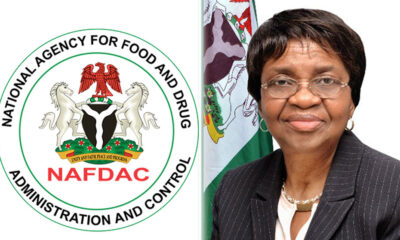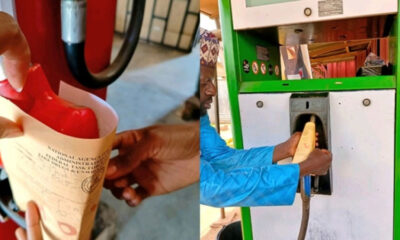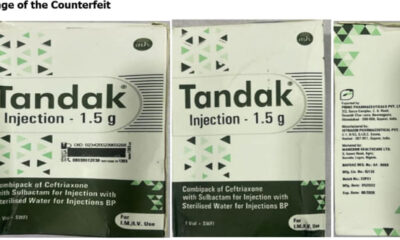News
NAFDAC totally bans sale of alcoholic beverages in satchel

NAFDAC totally bans sale of alcoholic beverages in satchel
The National Agency for Food and Drug Administration and Control (NAFDAC) on Monday placed a total ban on alcoholic beverages produced in sachets less than 200ml.
The agency said the five-year window given to the manufacturers of the products to stop producing the drinks in sachets and pet bottles which began in 2018 elapsed on January 31, 2024.
It said enforcement of the ban commenced on February 1, 2024.
Director-General of NAFDAC, Prof Mojisola Adeyeye, announced the ban in Abuja.
She spoke at a media briefing, saying the ban was not a sudden development but a result of a multilateral Committee that agreed that the ban would be in phases whereby production would be reduced by 50 percent by 2020 while outright ban would be on January 31, 2024.
Given that decision, the DG said NAFDAC did not issue renewal licenses exceeding January 2024 to any manufacturer of the products.
She explained that the agency took the route of wiping out the drinks in such sachets because of the negative effects on underage children.
She said because the drinks came in pocket-friendly sizes, accessible and affordable, children easily fell for the packages only to face the consequences in the future.
She said, “This decision was based on the recommendation of a high-powered committee of the Federal Ministry of Health and NAFDAC on one hand, the Federal Competition and Consumer Protection Commission (FCCPC), and the Industry represented by the Association of Food, Beverages and Tobacco Employers (AFBTE), Distillers and Blenders Association of Nigeria (DIBAN), in December 2018.
“As a commitment to the decision reached at the end of this committee meeting, producers of alcohol in sachets and small volume agreed to reduce the production by five percent with effect from 31st January 2022 while ensuring the product is completely phased out in the country by 31st January 2024.”
News
Drama as Delta workers boo Gov Oborevwori over minimum wage

Drama as Delta workers boo Gov Oborevwori over minimum wage
Delta State workers expressed their disappointment with Governor Sheriff Oborevwori on Wednesday as he failed to address the issue of minimum wage during the 2024 May Day celebration in Asaba, themed “People First.”
Anticipating news on the minimum wage, the workers were disheartened when the Governor concluded his speech without mentioning it, prompting them to chant, “no, no, no, we no gree, pay us our minimum wage.”
Despite the interruption, Oborevwori stood firm, stating, “Listen to me, listen to me, calm down, calm down, you cannot cajole me.”
The celebration, which included a march past by various affiliate unions, turned sour due to the workers’ dissatisfaction with the governor’s silence on the wage issue.
READ ALSO:
- Neighbour, son beat mother of four to death in Edo
- London sword attack leaves British-Nigerian teenager dead
- Lagos uncovers 86 rooms under Ikoyi bridge where tenants pay N250,000 rent
According to a union leader, previous attempts to address the matter with the Governor proved futile.
In response, Governor Oborevwori announced plans to establish a committee to address the workers’ demand for salary increases amidst prevailing economic challenges. He praised the workers for their support and assured them of his administration’s commitment to workers’ welfare.
“I have listened attentively to your requests, and I have taken note of them; they are, no doubt, legitimate demands and as a responsible government, I will deliberate with my team on how best to address them within the limits of the resources available to us,” he affirmed.
In a statement delivered by Comrade Goodluck Ofobruku, the State Chairman of the Nigeria Labour Congress, NLC, he emphasized the importance of politicians keeping their promises, stating, “We want promise keeper politicians because, as workers, we keep records of promises.”
Drama as Delta workers boo Gov Oborevwori over minimum wage
News
Two million bank accounts closed over BVN, NIN, others

Two million bank accounts closed over BVN, NIN, others
Commercial banks in Nigeria closed 2.021 million bank accounts in the first quarter of 2024, Q1’24, to clean their books of questionable accounts and comply with regulatory orders on the linkage of bank accounts to the National Identity Number, NIN.
This is contained in a report by the Nigerian Interbank Settlement System, NIBSS, which also indicated that the number of inactive bank accounts grew month-on-month, MoM, by four million or 2.0 per cent to 19.7 million in March 2024 from 19.3 million in the previous month, February.
A bank account is classified inactive when it records zero transactions including deposits, withdrawals, transfers or point-of-sale transactions for six months.
READ ALSO:
- Senate insists on 16 years as requirement for tertiary institution admission in Nigeria
- Minimum wage: Labour threatens nationwide strike by end of May
- UCL: Füllkrug gives Dortmund 1-0 first-leg win over PSG
However, details of the “Industry Bank Account Database”, a monthly data reported by banks, and compiled by the Nigerian Interbank Settlement System, NIBSS, also indicated that the number of active bank accounts grew by 6.62 million or 3.0 per cent to 219.64 million from 213.02 million in February.
Recall that in December 2023, the CBN issued a directive to all commercial banks in the country to restrict tier-1 accounts without proper Biometric Verification Number, BVN, and National Identity Number, NIN, that are not linked by Thursday, March 1st, 2024.
According to NIBSS data on BVN enrollment count, 61.6 million Nigerians have BVN as of April 2024.
Two million bank accounts closed over BVN, NIN, others
News
Senate insists on 16 years as requirement for tertiary institution admission in Nigeria
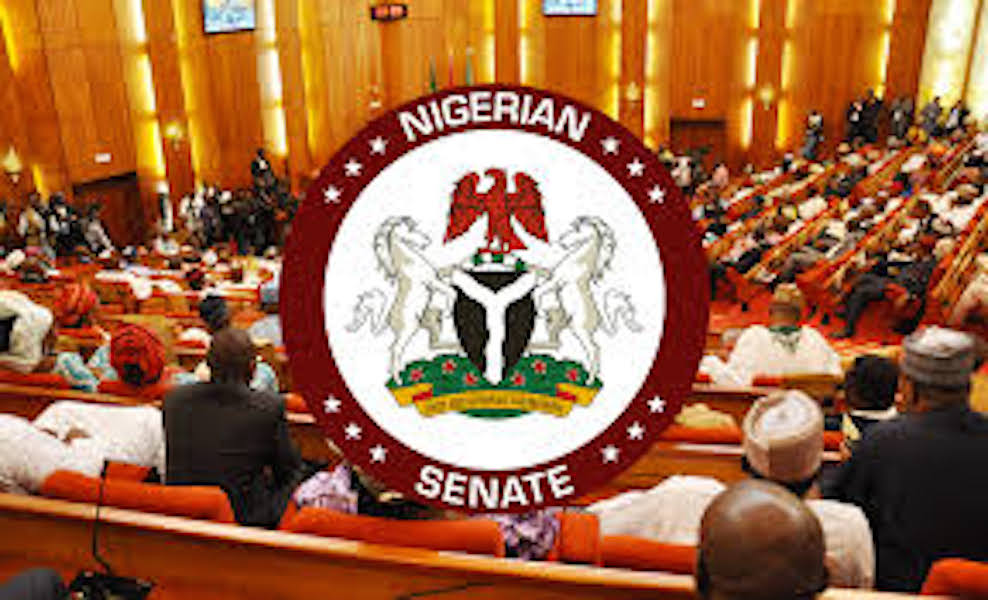
Senate insists on 16 years as requirement for tertiary institution admission in Nigeria
The Nigerian Senate has moved to clarify recent discussions regarding the minimum age requirement for admission into tertiary institutions.
The red chamber assured Nigerians that the current age requirement of 16 years has not been altered and that recent comments suggesting an increase to 18 years were personal opinions.
READ ALSO:
- Minimum wage: Labour threatens nationwide strike by end of May
- UCL: Füllkrug gives Dortmund 1-0 first-leg win over PSG
- Adopt quarterly exchange rate for Customs duty, economist advises FG
Chairman of the Senate Committee on Media and Public Affairs, Adeyemi Adaramodu, emphasised that any changes to the age requirement would require legislative action following due process.
Adaramodu explained in an interview with journalists that comments made by the Minister of Education, Prof. Tahir Mamman, about increasing the minimum age limit were not legally binding but rather personal opinions.
The Minister of Education had previously hinted at plans to review and raise the minimum age for admission into tertiary institutions to 18 years.
Senate insists on 16 years as requirement for tertiary institution admission in Nigeria
-

 metro2 days ago
metro2 days agoLabour Day: Nigerian workers are dedicated, resilient, says NURTW leader
-

 Education3 days ago
Education3 days agoBREAKING: JAMB releases 2024 UTME results
-
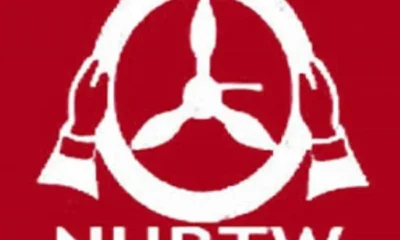
 Auto21 hours ago
Auto21 hours agoAppeal court takes over NURTW case as NIC withdraws
-

 News2 days ago
News2 days agoAmid fuel scarcity, petrol marketers threaten to withdraw services over ₦200bn debt
-

 metro3 days ago
metro3 days agoBREAKING: Suspected herders kill 3 mourners, farmers in Enugu
-

 metro6 hours ago
metro6 hours agoSecurity forces, vigilantes arrest kidnapper terrorising communities in Kogi
-
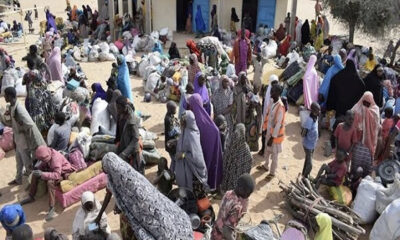
 News2 days ago
News2 days agoFG set to repatriate 20,000 Nigerians from Chad, Cameroon
-

 News3 days ago
News3 days agoSeun Kuti retracts allegation on P&ID fraud, tenders apology

